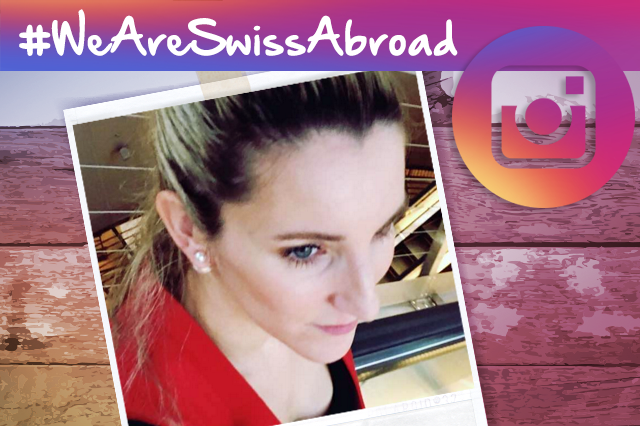
Jacqueline Tschumi: “Not much flexibility in daily work life”

Five years ago, she left for Japan on a diplomatic internship and fell in love with her new home. Now, Jacqueline Tschumi has no desire to return to Switzerland. But the 32-year-old does miss Swiss efficiency and quick access to the great outdoors.
swissinfo.ch: Why did you leave Switzerland?
Jacqueline Tschumi: I applied for an internship at the Swiss embassy in Japan to get some work experience and find out more about life as a diplomat. The initial four months turned into a year, and after a short visit to Switzerland they turned into another three-and-a-half years during which I was working as permanent employee at the embassy.
swissinfo.ch: Do you intend to ever return to Switzerland?
J.T.: I don’t really know when, however, I assume that I will go back to Switzerland in the long run.
swissinfo.ch: What were the first few months in Japan like?
J.T.: Everything was new, exciting and adventurous. There was something new to explore every day. Japan, and as a matter of fact Tokyo, is a completely different world. We cannot imagine anything like it in Switzerland! I enjoyed everything to the full and fell in love with this country from the very first minute.

swissinfo.ch: What exactly do you do for living and how did it all come about?
J.T.: I have worked at Nespresso’s marketing department since August 2016. Before that I worked for the Swiss Business Hub JapanExternal link at the Swiss embassy for three years. I helped small and medium-sized Swiss companies establish themselves on the Japanese market. This work was very interesting and I learnt a lot about Switzerland’s business landscape for small and medium-sized companies as well as Japan’s professional life. After almost four years I wanted to see a different side of Japanese working life and decided to change to the private sector and join Nespresso Japan.
swissinfo.ch: What is the Japanese working environment like compared to Switzerland?
J.T.: I think it is pretty regulated, bureaucratic and inflexible, and for all these reasons it’s also quite inefficient. In April this year, Nestlé/Nespresso introduced flexible working hours that allow us to determine from where and when we want to work. This is very unusual for Japan. This system is very helpful for women with children as they can work from home. The women’s quota is relatively high at Nespresso.
swissinfo.ch: What does the political landscape look like in Japan? Are you interested in Japanese politics?
J.T.: Prime minister Shinzō Abe’s politics have made the country more conservative and patriotic. I know many foreigners who are worried. I am not really interested in politics but I keep up-to-date.
swissinfo.ch: What do you find more attractive about Japan compared to Switzerland? What do you think is the biggest difference between the two countries?
J.T.: The variety of possibilities in Tokyo. The city has many different faces and characters. The delicious and affordable food. The Onsen Culture of hot springs and the vibes of the big city. The most significant difference though is the fact that I am a lot more out and about in Tokyo. There is always something going on and people go out for dinner or drinks more often. In Switzerland, this would simply be too expensive and there is not that much on offer.
swissinfo.ch: Where do you currently live and what is life like there?
J.T.: I live in HatanodaiExternal link, which is a quiet quarter near Gotanda/Shinagawa in the south of Tokyo. I like it. There are many houses with gardens and public transport connections to other beautiful places such as Jiyugaoka and Futakotamagawa are very good. There are also some traditional shopping streets, such as Togoshi Ginza. From Hatanodai it only takes 15 minutes to get to the office, which is great. I used to live in Ebisu, which was completely different. It was more central, busier and had more bars and restaurants and shopping opportunities. I like both.
swissinfo.ch: You have lived in Japan for five years and are probably pretty familiar with Japanese culture and society. Are there still moments when you are taken by surprise?
J.T.: Yes, there are plenty of these moments. I am always surprised by how inefficient, slow or futile some of the staff is. Even though the service industry is extremely important here, it is pretty inefficient, which means it is not really customer-friendly.
I am still puzzled that I only get served half a glass when I order my drink without ice as the volume of the ice cubes is deducted. This would never happen in Switzerland as customers would not come back. But here they have enough other consumers. I guess the biggest difference is the lack in flexibility and the fact that people are not able to think independently and out of the box. Everything is done by the book.
The Japanese also don’t really question anything. Everything continues because “it has always been done that way”. If foreigners come along and ask “why?”, this is the only response they get. Changes are very unpopular and they take such a long time that one simply gives up and carries on as usual.
swissinfo.ch: How do you view Switzerland from afar?
J.T.: Switzerland is a paradise with a very high standard of living. Most Swiss are not really aware of how well off they are when it comes to their jobs, holidays, etc. For me, Switzerland is a beautiful and good country, however, it can be a bit “square” at times and I wish people would be more willing to see the bigger picture.
swissinfo.ch: Do you vote in Swiss elections or popular votes? And do you do it by postal vote or e-voting?
J.T.: Yes, but not always. I use the e-voting system.
swissinfo.ch: What do you miss most about Switzerland?
J.T.: Nature! The possibility to jump into a lake or a river to cool down in the summer and be able to get out into green spaces in no time. I miss that there are a lot less people there; that you don’t have to queue up all the time and you do not have to spend three hours in heavy traffic to get out of town.
Are you a Swiss citizen living abroad? Label your Instagram photos with #WeAreSwissAbroadExternal link.

In compliance with the JTI standards
More: SWI swissinfo.ch certified by the Journalism Trust Initiative


























You can find an overview of ongoing debates with our journalists here . Please join us!
If you want to start a conversation about a topic raised in this article or want to report factual errors, email us at english@swissinfo.ch.